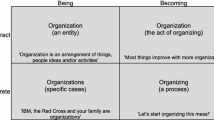Teaser
“Will systems biology come to play a role in all future sciences, analogous to the role that Newton’s classical physics played across the entire range of other sciences? I think that systems biology has the potential to influence thinking in all sciences as well as the way we think about societal issues. Shifting from the input/output and complicated system paradigm to the complex multilevel system paradigm also provides a basis for better understanding how financial systems function, or ought to function. The world is multilevel: from global to local, from resources and environment to high finance and politics etc. We therefore need new theoretical frameworks for dealing with complex phenomena. I believe the time is right for a wakeup call.”
Access this chapter
Tax calculation will be finalised at checkout
Purchases are for personal use only
Similar content being viewed by others
Notes
- 1.
Angiogenesis is a tissue forming process which originally was discovered as a prerequisite for cancer progression but has been identified in a number of other physiological processes as well, including wound healing, growth of neurons in the brain etc.
References
Bertalanffy, L. v. (1950). An outline of general system theory. The British Journal for the Philosophy of Science, 1, 134–165.
Bertalanffy, L. v. (1969). General system theory. Foundations, development, applications. New York: George Braziller.
Folkman, J., Hahnfeldt, P., & Hlatky, L. (2000). Cancer: Looking outside the genome. Nature Reviews Molecular Cell Biology, 1, 76–79.
Green, S., & Wolkenhauer, O. (2013). Tracing organizing principles: Learning from the history of systems biology. History and Philosophy of the Life Sciences, 35, 555–578.
Mesarović, M. (1968). Systems theory and biology – View of a theoretician. In M. Mesarović (Ed.), Systems theory and biology. Proceedings of the III systems symposium at case institute of technology (pp. 57–87). New York: Springer.
Mesarovic, M. D., & Pestel, E. (1976). Mankind at the turning point: The second report to the club of rome. New York: Wiley.
Mesarović, M., & Sreenath, S. (2006). Beyond the flat earth perspective in systems biology. Biological Theory, 1, 33–34.
Mesarović, M., & Takahara, Y. (1970). Theory of hierarchical, multilevel, systems. New York: Academic.
Mesarović, M., & Takahara, Y. (1975). General systems theory: Mathematical foundations. New York: Academic.
Mesarović, M., Sreenath, S. N., & Keene, J. D. (2004). Search for organizing principles: Understanding in systems biology. Systems Biology, 1, 19–27.
Noble, D. (2006). The music of life. Biology beyond the genes. Oxford: Oxford University Press.
Noble, D. (2012). A theory of biological relativity: No privileged level of causation. Interface Focus, 2, 55–64.
Nurse, P. (2008). Life, logic and information. Nature, 454, 424–426.
Weaver, W. (1948). Science and complexity. American Scientist, 36, 536–544.
Wolkenhauer, O., Shibata, D. K., & Mesarović, M. (2011). A stem cell niche dominance theorem. Systems Biology, 5(4), 1–16.
Wolkenhauer, O., Shibata, D., & Mesarović, M. (2012). The role of theorem proving in systems biology. Journal of Theoretical Biology, 7, 57–61.
Suggested Readings by Mihajlo Mesarović
Mesarović, M. (1968). Systems theory and biology – View of a theoretician. In M. Mesarović (Ed.), Systems theory and biology. Proceedings of the III systems symposium at case institute of technology (pp. 57–87). New York: Springer.
Mesarović, M., & Takahara, Y. (1975). General systems theory: Mathematical foundations. New York: Academic.
Mesarović, M., Sreenath, S. N., & Keene, J. D. (2004). Search for organizing principles: Understanding in systems biology. Systems Biology, 1, 19–27.
Author information
Authors and Affiliations
Corresponding author
Editor information
Editors and Affiliations
Rights and permissions
Copyright information
© 2017 Springer International Publishing AG
About this chapter
Cite this chapter
Mesarović, M. (2017). Complexity Organizing Principles: Prerequisites for Life. In: Green, S. (eds) Philosophy of Systems Biology. History, Philosophy and Theory of the Life Sciences, vol 20. Springer, Cham. https://doi.org/10.1007/978-3-319-47000-9_19
Download citation
DOI: https://doi.org/10.1007/978-3-319-47000-9_19
Published:
Publisher Name: Springer, Cham
Print ISBN: 978-3-319-46999-7
Online ISBN: 978-3-319-47000-9
eBook Packages: Religion and PhilosophyPhilosophy and Religion (R0)




